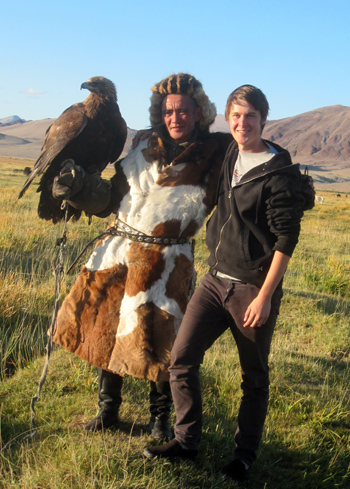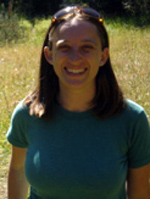Six UC Santa Cruz students – five in anthropology, one in environmental studies – have been awarded Fulbright scholarships for a year's study and research abroad.
Five doctoral degree candidates and one 2010 graduate will travel to China, the Kyrgyz Republic, Korea, Mexico, Trinidad and Tobago, and Venezuela to conduct their research projects.
They are among more than 1,500 U.S. citizens who will travel abroad for the 2010- 2011 academic year through the Fulbright U.S. student program.
UCSC had six successful applications from 11 submitted, a remarkably strong showing compared with the norm of other colleges and universities in past years. Final figures comparing applicants and winners from all U.S. institutions are expected in November.
"I am delighted that UC Santa Cruz continues to have such a high success rate among our Fulbright applicants," said Chancellor George Blumenthal. "It is another indication of the strengths of UCSC students and of our academic programs," he said.
Anthropology department chair Lisa Rofel, said the department "is enormously proud that so many of our students have been awarded Fulbright fellowships this year. I believe it speaks volumes about the quality of the students in our program and also about the intensive guidance our faculty give to our students."
Here's a look at the six Fulbright winners and their research proposals:
Sarah Eunkyung Chee
Anthropology Ph.D. candidate Sarah Chee was born in South Korea and emigrated to Southern California at age 3. She plans to return to her native country to continue her research into Protestant Christianity there, particularly its connection with defectors from North Korea.
Chee, 37, has already made seven trips to South Korea, including four conducting preliminary graduate research. She said that she has found a close connection between South Korea Protestants and North Korean defectors. Pastors in the south deliver sermons that place the north at the center of Korean Christianity by comparing North Koreans with the lost tribe of Israel, and calling the north the birthplace of Korean Christianity, Chee said.
"North Koreans are a gift sent by God for reunification," she recalls a South Korean Protestant working with North Koreans telling her.
Chee holds a B.A. in Asian American and East Asian Studies from UCLA and a M.A. from UCSC. Previously, her research has been supported by a Eugene Cota-Robles Fellowship and UCSC summer travel grant.
Nellie Chu
Nellie Chu is intrigued with Chinese manufacturing companies and how they break away from churning out products for foreign companies into creating their own designs, a phenomenon she calls "from 'Made in China' to 'Created in China.'" She plans to spend from September through December in the showrooms and factories of 10 designers in Shenzhen and Guangzhou.
"I've been interested in counterfeits for the longest time and want to look at the question of what is considered 'real,'" Chu said. "To what extent do they see themselves as artists."
Chu, 30, grew up in San Francisco where she took her Chinese heritage for granted. As a foreign exchange student in Germany she considered herself an American and was taken aback when a German native asked her where she was from. Her answer "America" didn't satisfy him. "No, where are you from," he insisted.
The exchange led Chu to contemplate what it means to be Chinese. Her research will probe the question with designers and factory workers who may begin with foreign designs only to improve them in a distinctly Chinese way. Chu is a Ph.D. candidate in anthropology. She holds a B.A. in International Relations and German from UC Davis. She's received support from a UCSC Regents grant, the UCSC anthropology department, and the National Science Foundation.
Jonathan Crosson
Spiritual Baptism is a Caribbean religion native to the islands from Trinidad to St. Vincent. Anthropology Ph.D. candidate Jonathan Crosson describes Spiritual Baptism as emphasizing imagined travel across national, ethnic, and religious boundaries through a ritual known as "mourning."
Crosson, 31, plans to spend a year in the islands researching how practitioners find their "true identity" through their spiritual travels that involve three days to weeks or more in blindfolded seclusion. The "mourner" may travel in the spirit to Africa, Egypt, India or China to find his or her spirit, Crosson says. He said he is interested in how these identities in the spirit may subvert or reinforce everyday understandings of ethnic identity, cultural heritage, and national politics in Trinidad.
Crosson, who grew up in Gainsville, Fla., graduated from Swarthmore College and taught in community college in Gainesville before enrolling at UC Santa Cruz where he obtained his masters in anthropology. He previously received a UCSC Regents grant and a UCSC executive vice chancellor fellowship.
Naomi Glenn-Levin
Naomi Glenn-Levin is in Tijuana and San Diego this summer and fall working with social services agencies that provide services for foster children. Thousands of people cross the border daily for school, work, and family obligations, Glenn-Levin says. Within that movement are families who come in contact with agencies on one side of the border, or both.
Her research will focus on the Tijuana branch of a family service agency and the San Diego County foster care system. She is especially interested in children who may be considered "abandoned" on one side of the border or the other due to immigration issues. She is also interested in the question of the "ideal family" and how that is interpreted in Mexico and the U.S.
Glenn-Levin, 27, grew up in San Diego, 30 minutes from the U.S.-Mexico border. She earned her B.A. in bilingual education and linguistics at Hampshire College. After graduation she taught at a project in Massachusetts to improve the quality of life for Spanish-speaking residents. She later taught Spanish at a small high school for students diagnosed with social and emotional learning disabilities. She obtained her masters in cultural anthropology from UCSC in 2009 and is working on her Ph.D.
Dennis Keen
Dennis Keen at 21 is the youngest Fulbright winner. He graduated from UCSC in 2010 with a B.A. in language studies and education.
Keen is an avid birdwatcher and Russian language speaker who first studied Russian in Kazakhstan the summer between his junior and senior years of high school. This month he will make his way to the Kyrgyz Republic, the former Soviet state in central Asia also known as Kyrgyzstan. There he will work to preserve the ancient art of hunting with golden eagles.
Keen, a fan of falconry, said he became fascinated with Kazakh nomads, known as berkutchi, who capture, train, and hunt with golden eagles in Western Mongolia. In the summer of 2009, he found a job teaching English there which enabled him to travel the country and interview eagle hunters. He learned that while Kazakh eagle hunters are thriving, those in the Kyrgyz Republic to the south aren't doing as well.
Only a few dozen are left, Keen said, mostly aging men. He wants to learn how they pass their ancient traditions from fathers to sons. More critically, he wants to help preserve the tradition. "If a well-coordinated preservation effort is not soon undertaken," Keen wrote in his proposal, "it is very likely that this tradition, which has survived for millennia, will not survive to see the next century"
Carlo Moreno
Carlo Moreno likes bugs. It began as a child fascinated with cockroaches in the Queens, N.Y. apartment where he lived and continued on summer trips to visit relatives in Colombia.
After a B.S. in biology from San Jose State and an M.S. entomology from the University of Maryland, Moreno, 31, an environmental studies Ph.D. candidate, is in the Venezuelan Andes for the next several months. There he will work with potato farmers to help restore traditional Andean long-fallow crop rotation techniques to restore soil fertility and promote pest resistance.
He'll be working above 12,000 feet elevation in the Mérda region of Venezuela, an area that has undergone dramatic change since a surge in potato demand and the construction of a trans-Andean highway. Old ways have been supplanted by rapid modernization including imported seed varieties, lack of diversification, and application of pesticides.
His research focus is agroecology, the development of sustainable agroecosystems, a field in which he hopes to teach.
Moreno, who once worked for the U.S. Department of Agriculture as an exotic pest inspector on incoming aircraft, said his interest in biological control began in Salinas Valley broccoli fields during an internship. He collected natural enemies of aphids, a common broccoli pest.
He has received a UCSC Regents grant, Eugene Cota-Robles Fellowship, environmental studies department grant, and COSMOS Club grant.




